Reneé Rapp Is Rewriting the Rules of Lesbian Pop Stardom
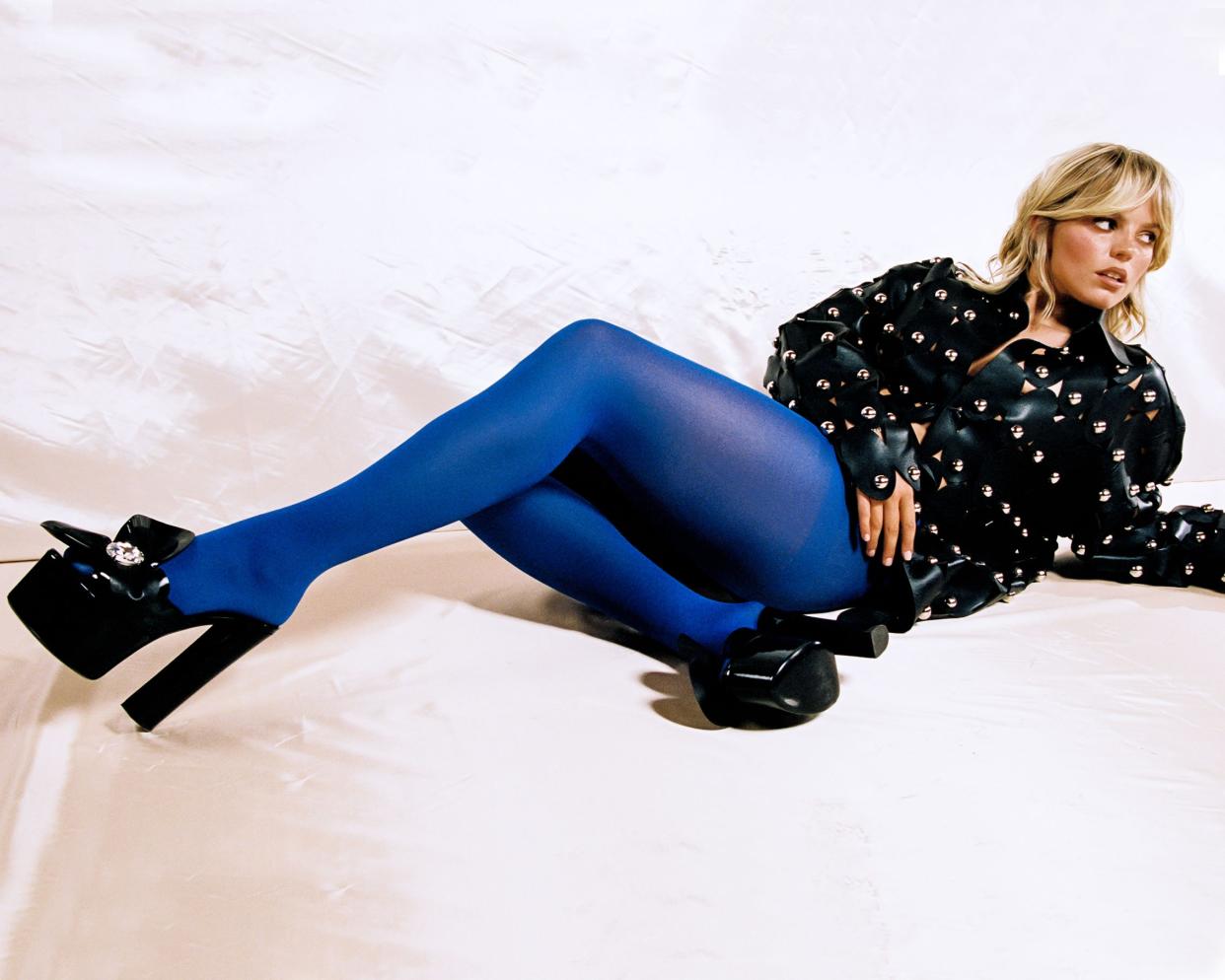
- Oops!Something went wrong.Please try again later.
Louisa Meng

Reneé Rapp is Them’s 2024 Now Award honoree in Music. The Now Awards honor 10 LGBTQ+ vanguards at the forefront of culture and change today. Read more here.
On a cloudy day in Los Angeles, Reneé Rapp appears like a blonde lesbian sunburst. By sight, everything about her gives off artfully dressed-down Angeleno celebrity: she’s wearing jeans and a black hoodie, with only a pair of silver hoops to suggest a secret life of pop stardom. But the second the 24-year-old opens her mouth, she reveals herself as one of the boldest, gayest, and chattiest young artists to ever come to California — someone who’s still every bit a loquacious Southerner with the gift of gab. “I grew up yapping,” the North Carolina native jokes. “I was talking to the bitch at the bank!”
There are many words that sound incredible when Rapp utters them. “Baby,” which she calls almost everyone in her orbit, engenders the sort of immediate intimacy that makes you want to join her cult. Each peppered-in curse is cathartic, a staccato note in the mesmerizing rhythm of her speech. But the word that spills most beautifully from her lips is “lesbian” — a descriptor she has applied to herself with increasing frequency and volume this year, as she has discussed her departure from Max’s Sex Lives of College Girls, promoted the Mean Girls movie musical, and performed on Saturday Night Live, where she was introduced in a sketch cameo as “our little lesbian intern Reneé.”
As it turns out, Rapp’s self-realization had something to do with how it felt to simply say the L-word out loud. During a previous relationship, the singer-songwriter found herself surrounded by a new group of queer friends. “All of a sudden, I had these people around me who were either nonbinary people, trans friends, or lesbians, and I was like, ‘I feel so happy when I’m with you guys. And I also really want to call myself a lesbian when I’m around you,’” she recalls over matcha.
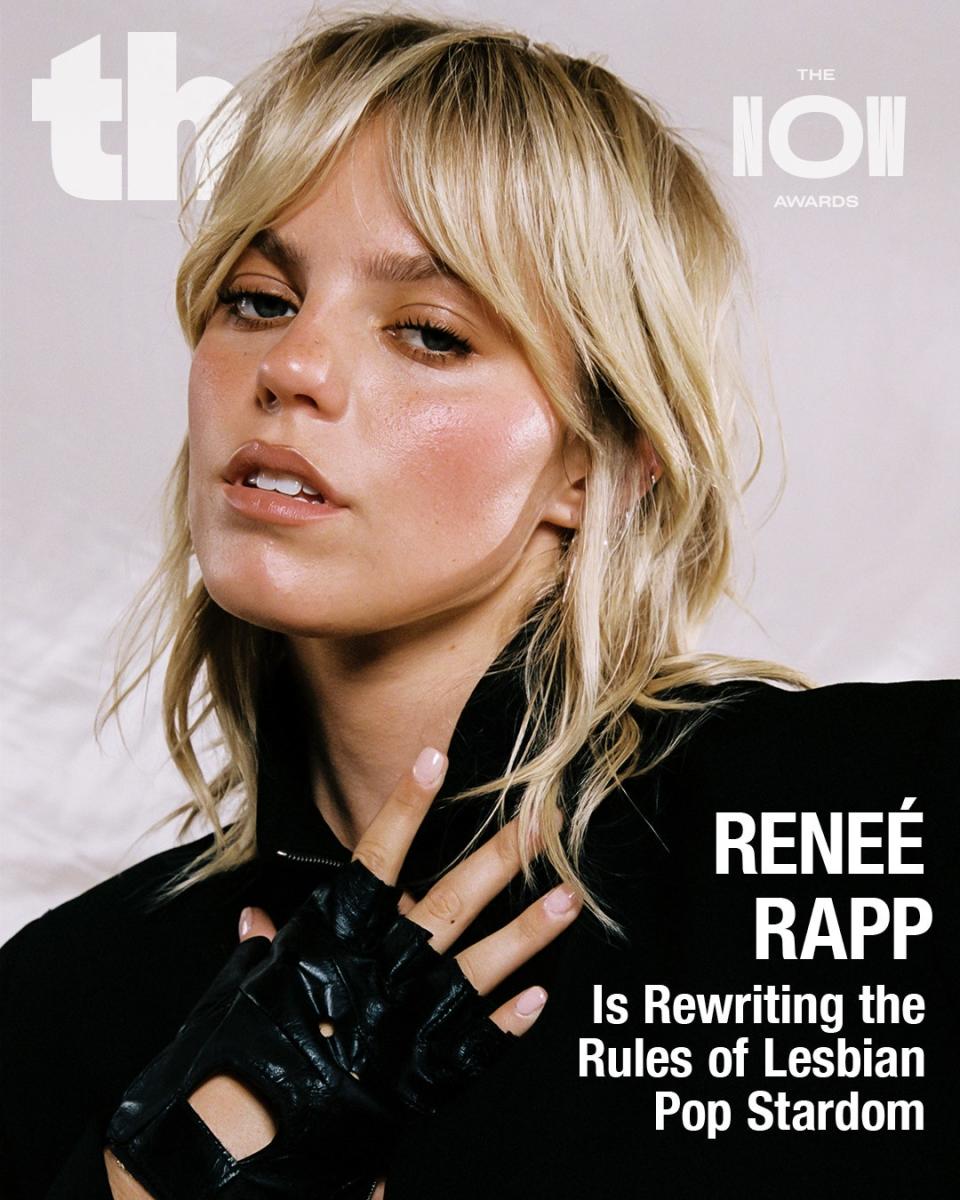
Of course, that wasn’t the entirety of her process. Out as bisexual since her teenage years, the Mean Girls star has done a fair amount of self-examination in recent months, even reading the notorious Lesbian Masterdoc last December. Who introduced the viral Tumblr guide to her? “Somebody so close to me in my life,” she says, after a devious laugh. “She was like, ‘Queen, do you want to read this?’”
Rapp is cursorily aware of the byzantine internet discourse about the helpfulness of the Lesbian Masterdoc, which everyone from Kehlani to your TikTok mutuals have praised as life-changing. “I’m sure for some people it doesn’t feel right,” Rapp says. “I don’t know all the nuances to the conversation. However, for me, it was really beneficial.”
One clue among many is that she never felt comfortable introducing her boyfriends to other people. “I was always like, ‘I refuse to call them my ‘boyfriend,’” she says. “They were always my ‘best friend.’ I dated someone for three years, and I would introduce him as my ‘best friend’ to people — and like, I’m sure that was dehumanizing.” (This is a night-and-day contrast to Rapp’s playful mode of address for her girlfriend, guitar icon Towa Bird, which is “my queen.”)
To fully embrace the new term, however, Rapp had to overcome a complex form of self-doubt. “When you’re bisexual, you almost want to prove yourself, so I thought it was kind of that,” she says of her draw toward the “lesbian” label. “But it came to be that, no, I’m actually just gay like that.”
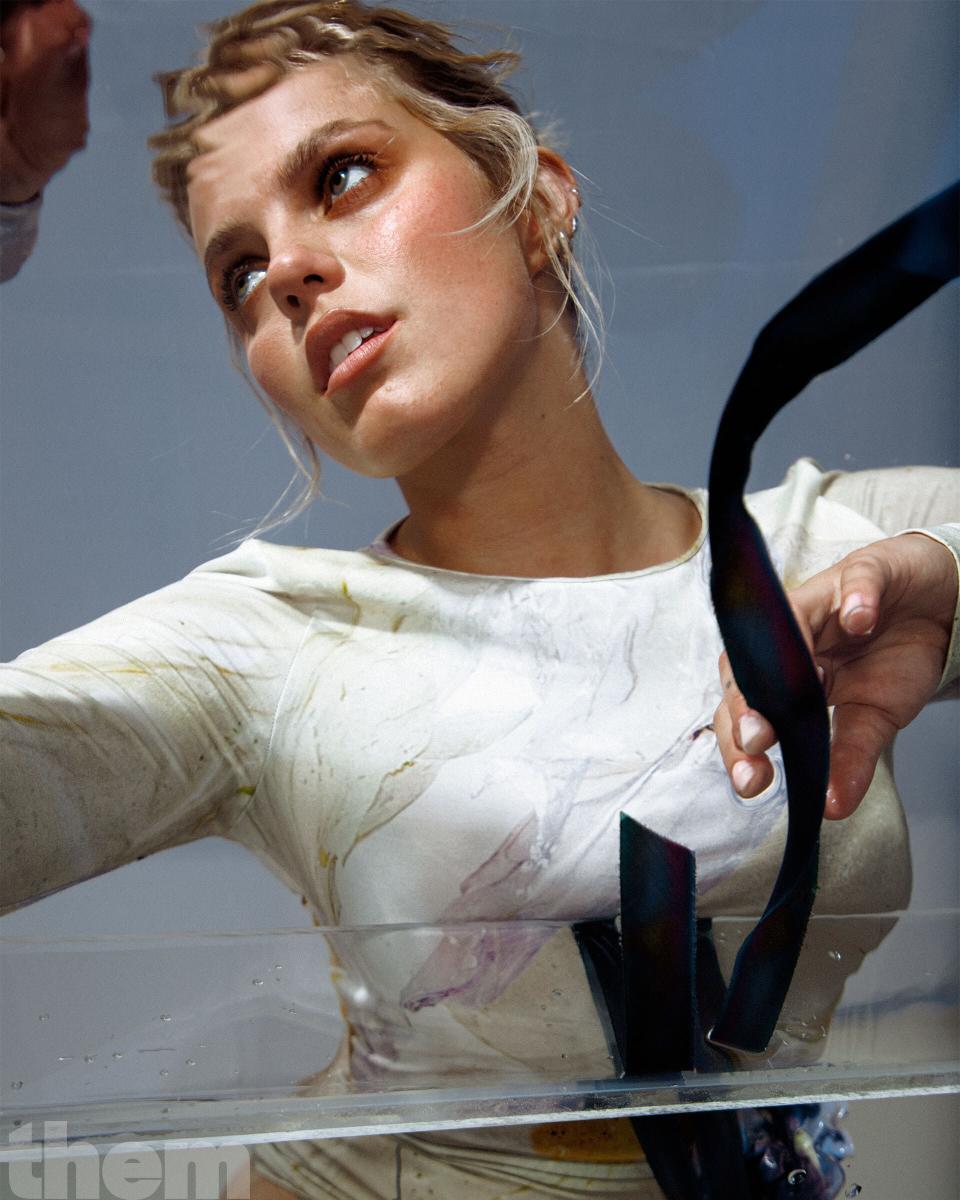
By January of this year, when Rapp performed on SNL, she was toying with the idea of making a more public pronouncement, but recent bad experiences gave her pause. “I had privately been calling myself a lesbian, saying it to my friends, and I heard a couple comments that really hurt my feelings,” she says. (One person, she remembers, sarcastically intoned: “Oh, amazing, you’re coming out again. Congratulations.”)
The line introducing Rapp’s sketch cameo — delivered by Bowen Yang playing a lip reading expert on an Entertainment Tonight-style program — was originally written as: “We need assistance from our little bisexual intern Reneé.”
Backstage before the show, a nervous Rapp asked staff writer Celeste Yim, the nonbinary comedian responsible for such classics as SNL’s “It Gets Better” parody, a seemingly innocuous question: “Can we change that ‘bisexual’ to ‘gay’?”
“They were so sweet — and obviously, they were going to be so sweet,” Rapp remembers. “But to me, I was thinking about being so afraid to publicly change my identity. I didn’t want anybody to be upset with me.”
Those pre-show jitters reveal a knotty truth at Rapp’s core. The outspoken star doesn’t care what people think of her, but she also cares deeply, to the point of overwhelming, almost suffocating anxiety. “I didn’t want to do it and be like, ‘Oh my God, I’m not using the word ‘bisexual,’ and make bisexual people feel shitty,’” she says, narrating her thought process. “I also didn’t want to be like, ‘OK, I’m ‘gay’ and have all the lesbians be like, ‘Say you’re bisexual, then.’ I felt so wrapped up and scared.”
With the clock ticking, “our little gay intern” still didn’t feel right. Rapp phoned a trusted friend to ask if she should make one final change to the script. “I think it would be really fucking sick if you came out as a lesbian on SNL,” the confidante told her — and then, with some last-minute assistance from Yim, Rapp really fucking did it. She grinned as Yang delivered the line, briefly gauging the audience reaction, and then killed it in the sketch, not to mention her twin musical performances.
“I stayed off my phone for a couple days because I was so fucking terrified and felt so shitty but then it was just, like, a thing, and it felt good,” she says, noting that she has still had to deal with people interrogating her identity afterward.
To say her trepidation has vanished entirely would be a lie. “I still have incredibly homophobic thoughts toward myself constantly,” she shares. But Rapp has reached a meaningful step in the long, sometimes never-ending climb toward queer self-love.
“‘Lesbian’ was not a good word for me to hear as a kid,” she says, “and now it’s something that I have such a close emotional connection to.”
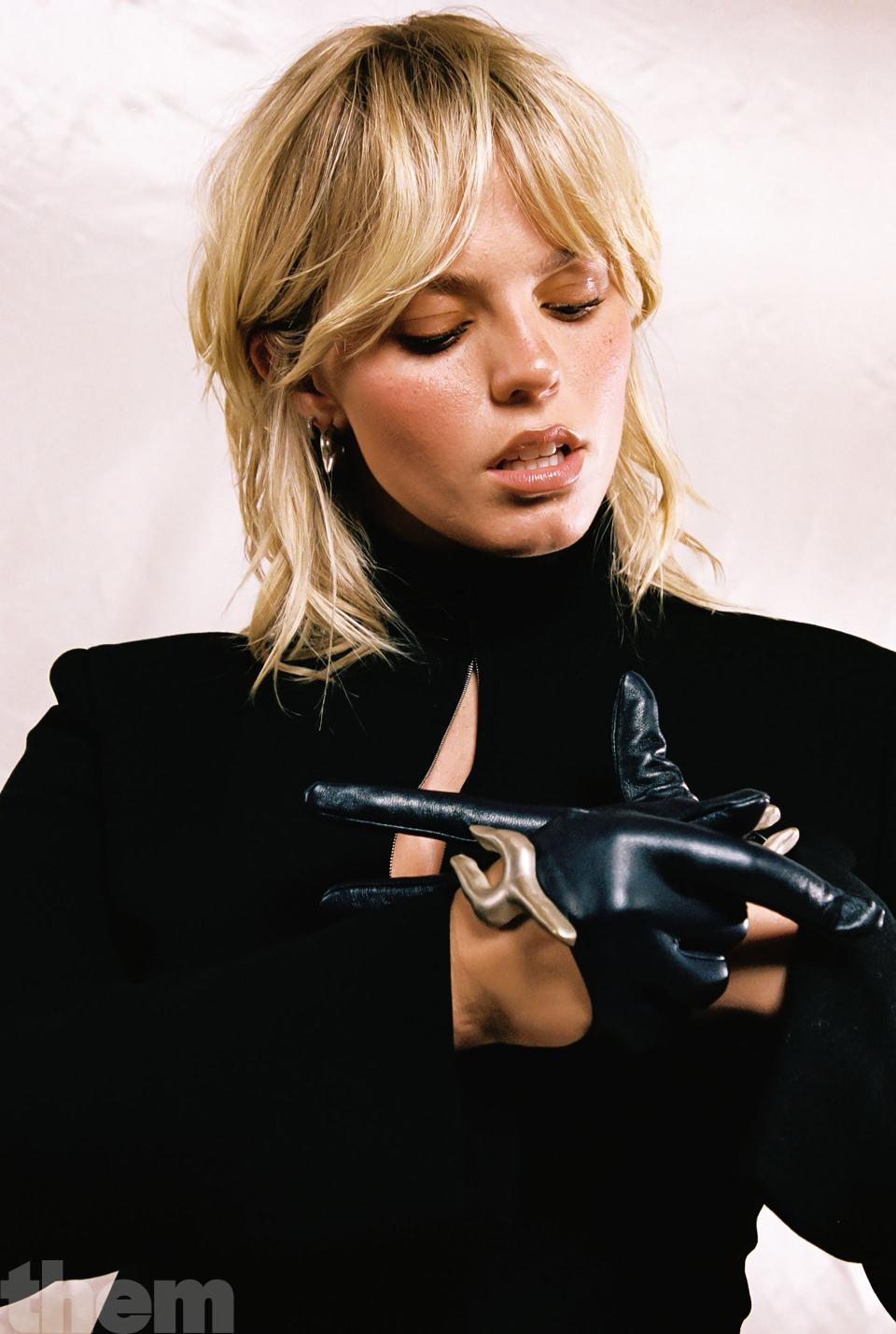
Before Rapp knew she was a lesbian, she knew she wanted to be a pop star. When pressed for the specific moment that vision formed in her mind, she says, “From the time that I was born. Literally, it was always a thought to me.” How can that be possible? It just was — an a priori knowledge that has defined her existence. “A lot of people have these aha moments,” she grants, sensing what any journalist wants to hear. “But I think I genuinely came out of the womb swinging.”
As a child, she idolized Beyoncé. She sang constantly. She sometimes had panic attacks if her parents didn’t play music in the car. “I would scream and cry and take my shoes off and throw them out on the highway,” she recalls. “It’s a little psychotic. It’s a little ‘play with your friends, girl.’ But I was like, ‘Beyoncé!’”
“My biggest fear in life is being misunderstood, and music is a place that I strive to not be misunderstood.”
Perhaps the best way to understand Rapp’s early draw to music is to realize that she has always experienced the same overpowering anxiety she felt right before coming out as a lesbian on SNL. Growing up in Huntersville, North Carolina, with her mother employed as an accountant and her father working in medical device sales, her day-to-day circumstances were stable enough. (She freely admits to having a “blessed and privileged life, lest we forget.”)
But internally, she was flooded with negative feelings. “I had a really difficult emotional childhood,” she says. “I had a tough time in my own head, as I’m sure so many people do, and I continue to, but as a kid it was just so isolating.”
She was also a queer girl growing up in a conservative state amid the casually ubiquitous homophobia of the 2000s — a “batshit” sociopolitical context she did not fully comprehend until she later moved away. She had a handful of gay friends in high school but “didn’t consume any queer media growing up,” she says. (She once admitted that Margot Robbie’s appearance in Wolf of Wall Street was the gayest thing she had ever seen.) Her earliest crushes on other girls occurred in the wonderfully stereotypical setting of her school’s musical theater program.
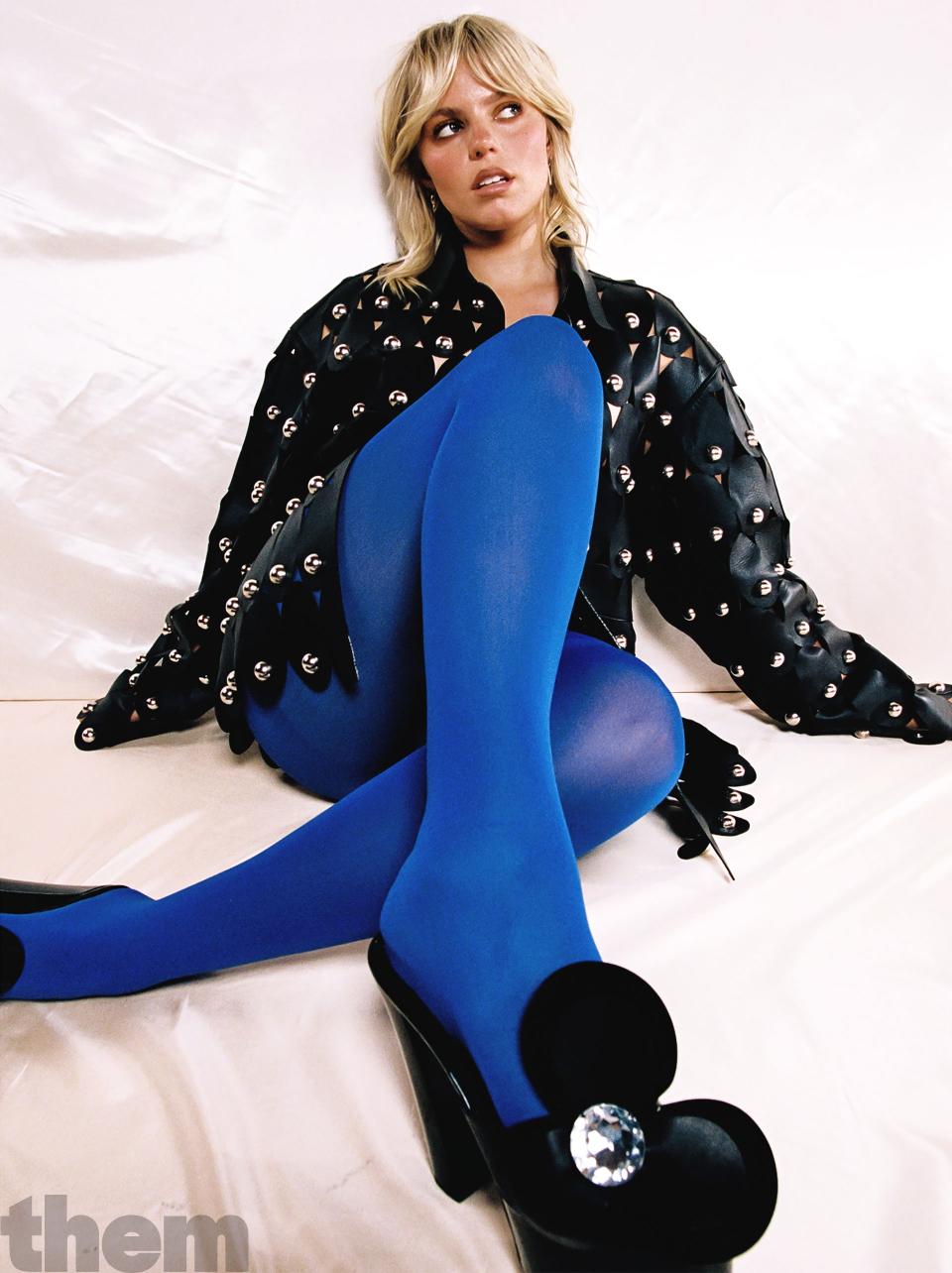
Amid a sea of samey-looking “infinity scarf white girls,” a 14-year-old Rapp felt attracted to young women who looked different from the pack. “I remember seeing a girl not wear a bra to a rehearsal in public for the first time and that was — like, I can see it. I remember it,” she says. Her response was immediate: “Oh, I’m in love with her. I’m in love with this spiky red-headed lesbian.” (Another early crush? Her golf coach. “I remember thinking she’s not my type but something about her was really hot and I think she might have just been gay,” she says. “I think her name was Jennifer. Dark hair. Tiny skirt. Loved her.”)
While Rapp struggled with her mental health and wrestled with nascent queer feelings that she lacked the language to fully express, music said the things she could not. “My biggest fear in life is being misunderstood, and music is a place that I strive to not be misunderstood,” she says. “I have brief moments of relief from my own brain when I feel like I understand myself and other people do, too. I don’t feel shame, whereas in every other part of my life, I do, pretty much 24/7.”
That relationship to music — not just a hobby, but a necessary form of self-therapy — is like a Rosetta Stone for unlocking the mysteries of Rapp’s whirlwind career, which has taken her from Broadway to HBO to the multiplex, all in the span of five years.
“‘Lesbian’ was not a good word for me to hear as a kid, and now it’s something that I have such a close emotional connection to.”
A breakout success in theater, Rapp won best performance by an actress at the Jimmy Awards, a.k.a “the Tonys for teens” in 2018. But the following year, when Tina Fey and Lorne Michaels approached her about becoming Broadway’s new Regina George after already trying to court her for the touring production, she was bracingly honest about her motives, famously telling them she wanted record industry introductions, as she relayed to the L.A. Times: “I know you guys know everybody. You book SNL. I’m not stupid.” Then, amid the disruption of the COVID-19 pandemic, she took a TV role, playing the preppy, plaid-obsessed Leighton Murray on The Sex Lives of College Girls for three seasons, only to leave the popular streaming comedy last summer to focus on her music.
To an outside observer, these moves might seem whiplash-inducing, even baffling. Rapp is aware that many artists see music as a backdoor into Hollywood, not the other way around. But she needs the medium the way she needs air: her own voice, her own songs, her own timetable. Music, she tells me, is “the one place that I actually feel kind of safe.” It is a sacred admission from a woman who often delights in irreverence.
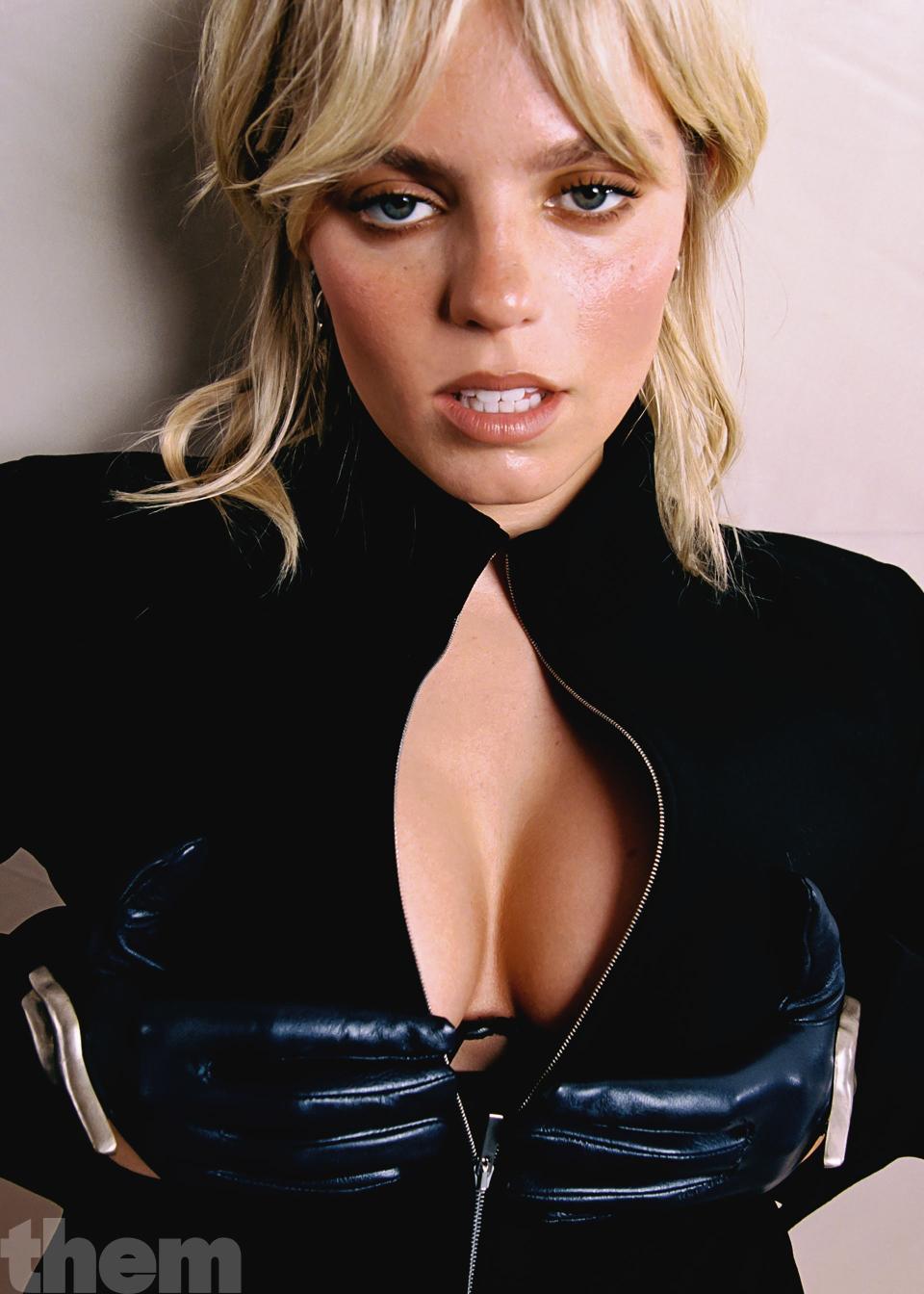
Earlier this year, horrified pearl clutchers and amused Gen Zers alike were glued to her “chaotic” press tour for the Mean Girls musical adaptation. Why didn’t she treat the starring role like a moment of profound personal arrival? Because it wasn’t. “We made a fucking movie musical in a fucking abandoned high school,” she says. “This is not God’s work, it’s just not.” No, those deeper moments happen at Coachella or on the VMAs stage, where she can reach for a peace she still can’t quite grasp.
What might look like a headstrong rush to become a pop icon is actually Rapp trying to get out of her own head, over and over again. It’s a feeling deftly described on “Swim,” which she tells me is her favorite song off the deluxe version of Snow Angel, her debut 2023 LP. Ostensibly about a turbulent on-again-off-again relationship, the song’s lyrics also capture what it might be like to live in Rapp’s mind: “I’m up in the middle of the night again / same beginning, middle, but still no end.”
“I put it all out there and I feel like I understand myself,” she says of her recurring inner cycle. “Then I take a second and I’m misunderstood again. And I need to understand.”
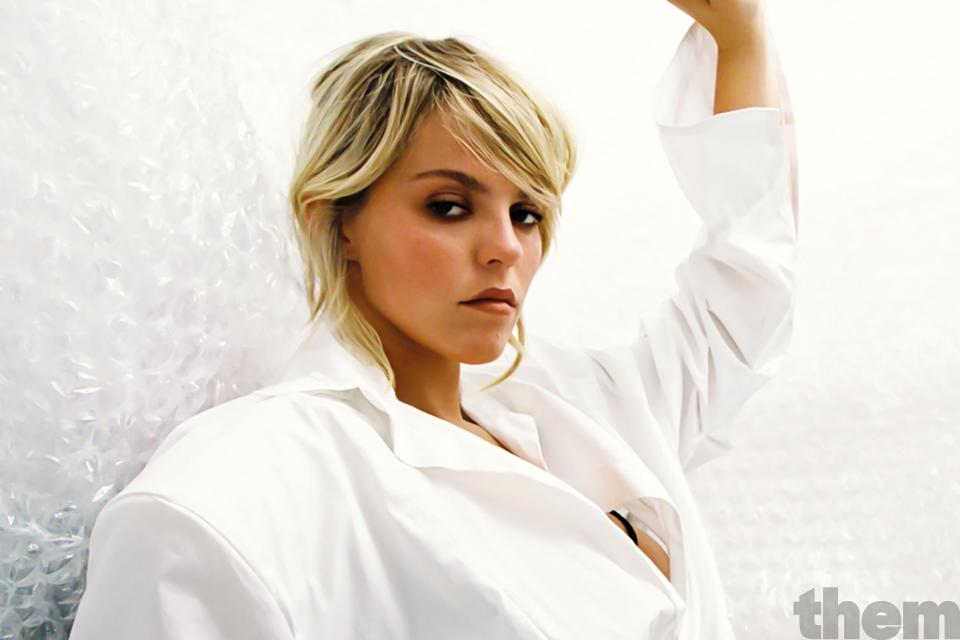
Rapp doesn’t regret anything she said on her infamous Mean Girls press tour. “No, not at all,” she confirms. She doesn’t regret settling old scores in the middle of a junket or saying she is “ageist” toward millennial women. “The only person who tells me to rein it in is my mom, when it comes to legal things,” she says. “I just don’t give a fuck.”
But the singer is not a bull in a china shop, thoughtlessly tearing through her public appearances. Rapp does, she says, sit up at night and think, “Oh my God, did I say that? I should have been more filtered and put together, and crossed my legs and dotted my i’s and done my, like, pretty girl thing.” Rest assured that media training is available to her. All Rapp’s edges could be sanded down to nothing the second she wanted them gone — but she doesn’t. “It’s not to say that I don’t care,” she clarifies. “It’s just more to say that this is who I am, and I’m never going to change who I am no matter how insecure something makes me.”
The same principle applies to her openness around recovering from an eating disorder or navigating her sexuality: the harsh self-judgment remains, despite a lack of self-censorship. She is not naïve to the fact that the entertainment industry still closes doors in the face of outspoken women, especially openly queer women, but she’s decided she’d rather not walk through them anyway. “I feel like we’re more entitled to our own personal wellbeing,” she says of the ethos guiding an emerging class of Gen Z celebs. “As opposed to people in the business in generations older than mine who have felt on so many different levels that they have to appease someone so that they can get another job. Which, don't get me wrong, is absolutely still there. It’s not something that I just don’t think about. I just don’t care enough. I just don’t give a fuck enough to be taken advantage of.”
“Whenever people are like, ‘Oh my God, you’re so unfiltered,’ I’m like, ‘I’m just talking.’”
Often, she is able to laugh about the overreactions to her ostensibly “unfiltered” statements, which is an adjective she finds funny in and of itself. (“Whenever people are like, ‘Oh my God, you’re so unfiltered,’ I’m like, ‘I’m just talking,’” she says.) The more scolding responses to her anti-millennial remark, for example, had her and her friends “cry-laughing in my house, because I was like, you bitches are the point.” (She is, in fact, surrounded by people over 30. “Everyone in my life is older than me and fucking hot and sick,” she says.)
But Rapp does take her public statements seriously when it comes to her political commitments. Rapp made headlines this March when she called for “an immediate ceasefire and permanent ceasefire in Gaza” during her acceptance speech at the GLAAD Media Awards — a notable public stance given that the LGBTQ+ advocacy organization itself has not taken the same position. Rapp says the speech was a “no-brainer,” calling it “the smallest good thing that I could potentially do.”
“For me, it’s something that I care about and talk about in my day-to-day life and hope that my family members, friends, and peers will do the same,” she says. Strategically, she wanted to leverage her own position of relative power as a “cis white girl” to make a statement others might not have had the platform or the security to make. “I know that I’m someone who will be safe, while a lot of my peers and friends will not, right? While people struggling and literally losing their lives in the Gaza Strip will not.”
Rapp does not think of herself as an expert on the finer points of progressivism. “I’m not, like, a god,” she says. But she is trying, increasingly, to be an expert on herself — to understand that she can speak her mind about LGBTQ+ issues or having “mass amounts of anxiety and OCD” without spending so many late nights replaying her own comments in her mind. “I am striving every day to judge myself less and less for this,” she says, “because I would never judge someone else for it.”
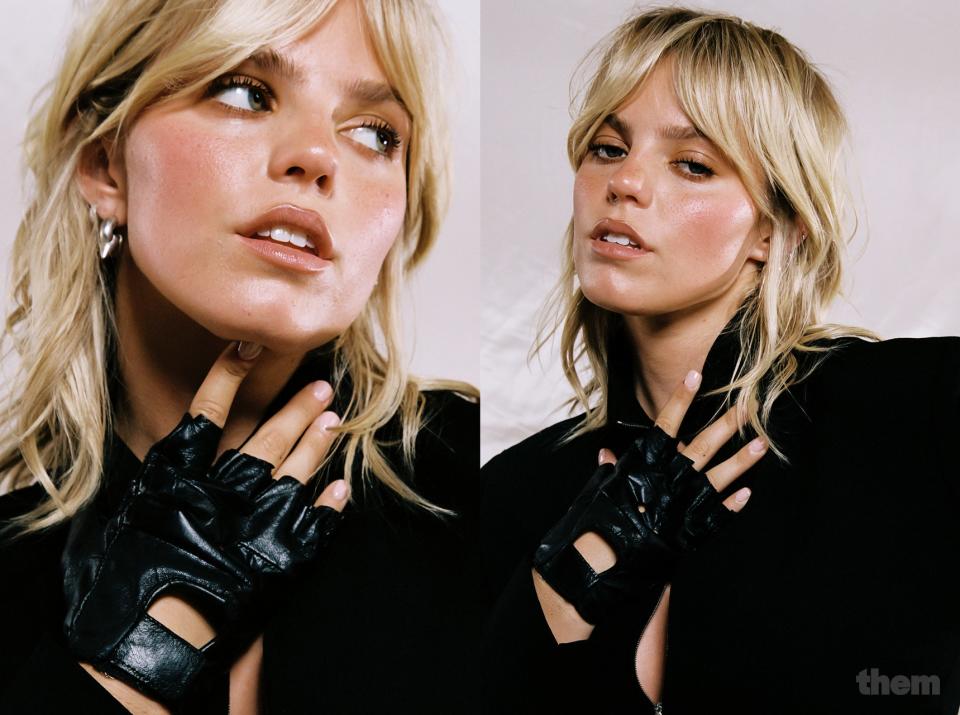
Much of Reneé Rapp’s insomnia these days can be attributed to her work ethic. A Capricorn through and through, she recently took her first real period of extended time off as an adult— a month post-Coachella, to be exact — “and let me tell you,” she says, “I’ve thought about work every second of every day.” The day after our interview, she is flying to Alabama to perform at a music festival, then it’s off to Boston, the Governors Ball and beyond. She is already a pop star — but she is on the brink of something bigger, and she can taste it.
Measured by units sold, Snow Angel was the biggest female solo debut of last year. The album was warmly received as a successful display of Rapp’s bona fides, showcasing her skills as both a ballad-belting vocalist and a wry pop personality. But Rapp’s December single “Not My Fault,” recorded with Megan Thee Stallion, revealed a confident new direction for her sound and public image. She credits her collaborator with giving her a much-needed ego boost while crafting the disco-pop track. “Meg has made me love my body a little bit more,” she says.
On set for the music video, Rapp was “so scared to show any part of my body, just because I am always so scared to show any part of my body.” But when she took off her fur coat, and Megan saw Rapp in her bodysuit and Jean Paul Gaultier tights, the rapper reportedly said, “I know you don’t have an ass like that.” (“I fear I do,” was her response.) The result of that exchange was the single’s, ahem, derrière-forward cover art. “I can’t believe I got to have my ass out like that next to Megan,” Rapp says.
When it comes to her continuing musical evolution, Rapp grows uncharacteristically tight-lipped. She shares that she’s “starting into sessions next week” and that her next LP officially has a title, but she won’t reveal it. She is deep in the laboratory, both sonically and aesthetically, consulting mood boards and plotting for the future like a mad gay scientist. “I actually genuinely wish I could think about it less,” she says. “I wish I could enjoy life a little. I can’t relax.”
Whatever she’s working on is likely to be influenced in some capacity by Bird, whom Rapp praises as “a generational talent” with impeccable taste. “Everything I do in a way gets run by Towa,” Rapp says, affirming that she “totally would” work with Bird on new music in the future. “I’m fucking obsessed with her,” she says. “She’s everything. She’s just so fucking smart.” (And yes, Rapp has seen the Autostraddle post comparing the couple to Bette and Tina from The L Word, but she does not agree. “I am no Tina,” she maintains.)
Beyond these small teases, Rapp’s interest in “yapping” vanishes here. She wants whatever comes next to be hers alone, for just a bit longer. “I’m excited to be more private about what it looks like as I find it out,” she says, a Cheshire smile spreading on her face. “It feels like this exciting little discovery of a secret,” she says. “I’m not even sure what it is yet, but I know it feels really good.”
Talent: Reneé Rapp
Photographer: Louisa Meng
Lighting Director / Digital Tech: Stefan Vleming
Stylist: Jasmine Amini
Stylist Assist: Megan Morales
Hair Stylist: Joseph Maine at A-Frame Agency
Manicurist: Rachel Messick at Celestine using Kokoist
Makeup Artist: Loren Canby at A-Frame Agency
Production: HyperionLA
Studio: Hype Studios
Editor-in-Chief: Sarah Burke
Art Director: Wesley Johnson
Talent Director: Keaton Bell
Senior Culture Editor: Samantha Allen
Get the best of what’s queer. Sign up for Them’s weekly newsletter here.
Originally Appeared on them.

